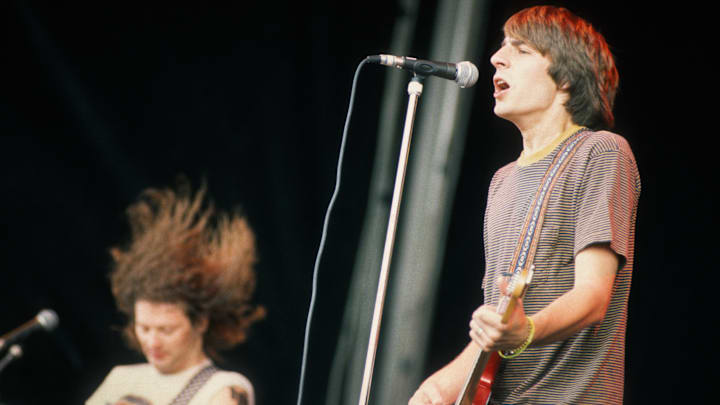We’re going to close out our remembrance of forgotten albums from the 1980s with a dozen releases from the end of the decade – 1986-1989. Now, when I say “forgotten,” I realize these are not forgotten by everyone. Some are beloved classics to fans of their particular genre. I’m referring more to the public at large.
These albums may have been popular 35 years ago. They may still show up on critics’ lists. But I find that all twelve of these never come up in conversation, even when I am conversating with big-time music fans,
And, lest I protest too much, rest assured that a few of these are indeed obscure. I can promise you haven’t heard of at least half of them. OK – maybe you music scholars out there have heard of them, but I’d venture to say you don’t think of them all that often.
Forgotten gems from the late 1980s that deserve more love
Or maybe I’m wrong.
I do know this much: continuing on our theme of eclecticism in the ‘80s, these albums indeed run the gamut of styles. Futuristic or throwback – electric or acoustic – instrumental or vocal – the ‘80s had it all.
I didn’t set out to make this list as broad as it became. I just went looking for a dozen albums that I had liked at one time and had largely forgotten about. Had I so desired, I could have kept things much more genre-specific. For instance, you may find a metal album included in the selections for 1987. 1987 was a good year for metal – especially speed and thrash. I could have very easily chosen three metal albums from 1987 alone.
But then I remembered a couple of other albums that I thought deserved some love. One of them was kind of a cousin of metal while the other was as far removed as is musically possible.
So that’s what you get today. A very wide range of albums released between 1986 and 1989 – three from each year – constitute a dozen fabulous forgotten albums that certainly deserve a new listen in a new year.
Beginning with …
1986
Demonocracy: The Singles 1982-1986 by The Three Johns
Guitarist Jon Langford formed The Three Johns as something of a side project when his band, the Mekons, took a bit of a break in the early ‘80s. Along with bass player John Brennan and vocalist John Hyatt (not the American who spells his name with an “I”), they released their first album in 1984 – Atom Drum Bop. Like their contemporaries across the pond, Big Black, TTJ typically used a drum machine in place of a live drummer.
They also released a number of singles and those were gathered up in a couple of collections called Demonocracy. The first of these contained 11 singles. At least one subsequent release would include another song or two. The jittery, melodic punk comes through loud and clear on the opening track “English White Boy Engineer.” It is followed by the jangly “Pink Headed Bug,” with Hyatt’s tremulous tenor floating atop an effervescent rhythm. They go primordial on “Men Like Monkey,” paired with the bizarro-world “Two Minute Ape,” which is a mumbled, echoey incantation crawling beneath that aggressive drum machine and other assorted sounds.
The Three Johns performed a lot of political songs, commenting on current world events, and Hyatt’s lyrics were often compelling. But much like a different punk band for the States – Minutemen – the band was effective because the tension in their music always complemented their more confrontational songs, while still remaining tuneful.
Talking with the Taxman About Poetry by Billy Bragg
Speaking of political statements, Billy Bragg opened his second album – Talking with the Taxman…, with a positively jangly romance. That wasn’t exactly what Bragg was known for at the time. He had been the new Dylan – punkier and more obviously British – but equally trenchant in his examination of the times. But Bragg always excelled at heartbreak, and on the second album, he upped his musical game to match his lyrics. His acoustic guitar propels “Train Train,” but it is aided greatly by Bobby Valentino’s chugging violin.
Then, on “The Marriage,” there are entirely different sounds, which, on closer listens, turn out to be trumpets and flugelhorns. Those horns reappear on one of the standouts – the bluesy “Levi Stubbs’ Tears” - which namedrops not only the Four Tops’ booming singer but also the icons of Motown songcraft, arguing that music is the best remedy for the harshness of the way we all treat each other. But if you want politics, Bragg uses Dylan’s “Chimes of Freedom” as the basis for his political contemplation “Ideology.”
Reconciled by The Call
The Call seemed on the verge of breaking at the time of their fourth album. Frontman Michael Been and his band played shows in support of Peter Gabriel in 1983 and their sound was growing into very sophisticated rock. Been was a strong singer. You can hear it on tunes like “I Still Believe” and “Blood Red.”
But despite some shimmering keys, The Call could also rock, as on the slow-burn rockabilly of “Oklahoma” or the driven folk-tinged “With or Without You,” which could have been a Richard Thompson song. I've been getting better and better as a songwriter, and that combination of roots rock with organ and keyboard flourishes put some listeners in mind of The Band. I never really heard it myself, but Garth Hudson did play on one of the Call’s best-loved songs, “When The Walls Come Down” from their second album. Reconciled is their most consistent album, without a single weak track.
Continued on next slide...
